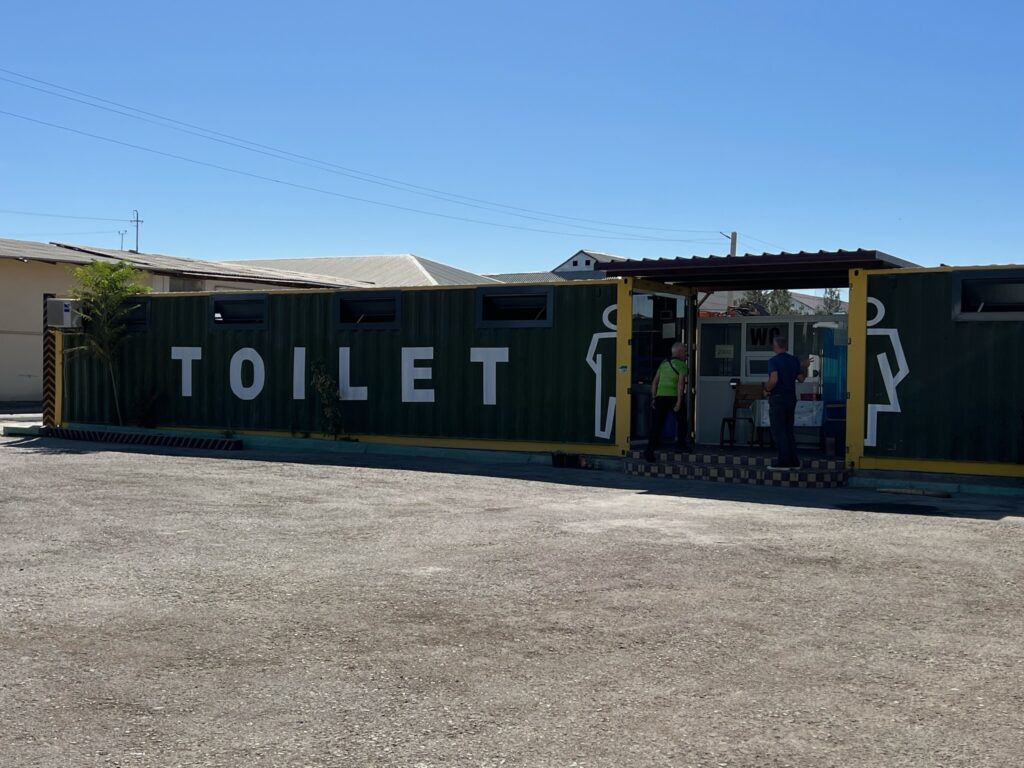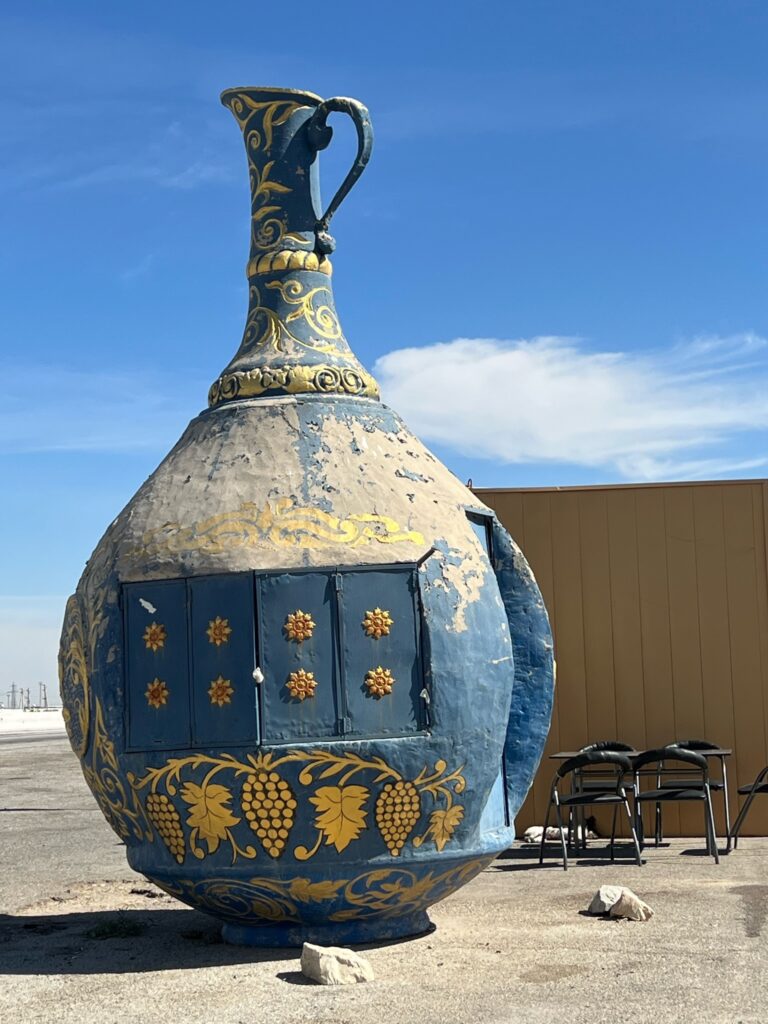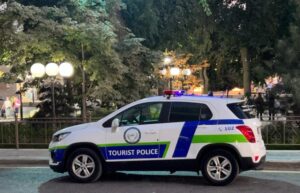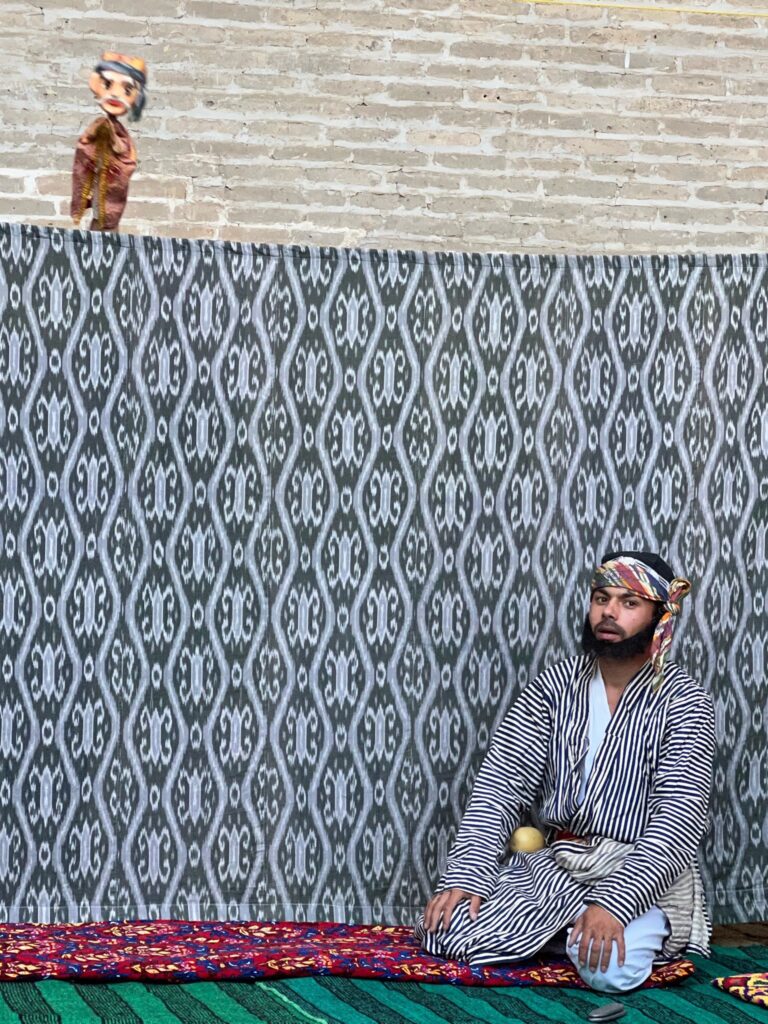29 September 2022
We travel by bus for 175 miles west from Samarqand through green agricultural land, quiet sunbaked villages and towns to Bukhara, fifth largest city in Uzbekistan. I am introduced to this major caravan city along the Silk Road, Temur’s second city and a UNESCO World Heritage Site – via a puppet show. But first – I must suffer undulating rough roads for five hours in order to get there! During the ride, my Activity Tracker has registered over 5000 steps and 14 floors. Definitely cheating but I’ll take it.
Our stops along the route are mostly for bathrooms which have improved in this part of Uzbekistan. We take a few minutes to visit a 1000 year old caravansaray and ancient water well. This is open desert, leaning trees give an indication of the horrific winds which pummel this region. No mountains break up the wind’s passage. Former travelers of the Silk Road stopped at caravansaray, or traditional roadside rest areas for caravans. Sharing its ancient accommodations were both men and animals, for both protection and rest. Water wells were fed by springs of fresh water. There were no Magnum Bars.

On the boring 5-hour drive from Samarqand to Bukhara, we learn more facts to distract me from the endless miles of agriculture, undulating bumpy roads, countless white Chevys, and occasional donkey cart. A “bullet train” covers this distance faster and on a level surface, but we wouldn’t get the informative talk or the snacks
Medical insurance is not compulsory nor does the state pay for any major surgeries. Though free under the Soviets, once they left so did the free medical for anything other than an emergency. A neighborhood office staffed by locals determine if the state should financially help if you can’t afford it. Your neighbors know if you are faking poverty. Vaccines are provided to age 18 and there are generous benefits for veterans. Uzbekistan acts as a center for medical tourism for the other Stans but for serious operations, Uzbeks go to India. (A hip replacement here 11k but India 6000$.)
I am told wages are improving. This has resulted in less corruption especially with traffic police, who are everywhere and had the worst reputation. Doctors earn $600-1000, nurses $200-500. However, cost of living is such that an apartment costs 30-40k to buy. Utilities are very cheap. Average salary for an Uzbek is 500$ on which he can live well. Teachers are not well paid but can earn more in hardship areas.

Corruption continues in government. On a scale of 100, Uzbekistan is the 28th most corrupt country. Gas, oil and cotton remain a monopoly. The white gold of cotton is a big cash crop for the owners. Doubt they are paying those women much for a day’s back breaking labor and child labor continues. But 10 years ago 70% of businesses were owned by state compared to todays 30% or so. Still, there is lots of room for improvement.
More desert, more cotton fields, more women bending over picking this “white gold” for the state. More desert. More bumps and undulations, tall piles of white gold. Countless white Chevys, occasional donkey cart with small tired donkey.

In spite of cameras and the ubiquitous Traffic Police along our route, there seem few rules. It appears U-turns in the middle of any road, even for big buses, is okay. There are more dents here. A few crumpled cars on open display along the road. As warnings? Most of these cars look like Ladas and wouldn’t take much to crumple. Perhaps it is an anti-crappy-Russian-car advertisement.
The education system drastically changed with the arrival of the Russians around 1920. They closed most madrasas and required children to get a public education. These schools taught more subjects and left religion to be taught at home. Literacy increased. Today public schools remain free and by 2025, 12 years of education will be required; university remains costly, for them, at about $4000 and many students study abroad many in the US. Young students often approached to ask if they could practice English with us. Their vocabulary and clarity were excellent. So far, I know two words, rakmat (thank you) and masla (butter).
More women are expected to get an education and work but traditional expectations remain for women in the home. Open affection is not welcome and censors leave the kissing scenes on the cutting room floor.
While five political parties exist, voting for president every 5 years, they have had only two since independence in 1991. There are more women legislators; the head of the senate is a woman. Military is no longer required for employment and Uzbekistan is moving forward toward a professional army. Women are allowed in administrative positions. Because pay is generally good as are the medical, educational and housing perks, the level of corruption has dropped. Same goes for positions of firemen and police.
Uzbeki weddings are very expensive. Where Tajikistan restricts size and numbers you may invite as a way to control crazy spending, Uzbekistan does no such thing. Here it is all about the children and what parents provide for their children. When they marry (average age between 23 and 29 for men), everything is done for them by parents from building their home to buying its furnishings be it a tv or clothing. Then children take care of parents in return. And a girl must be able to cook or it is treated as a great tragedy and failing of her family.
My lodging is at the Asia Hotel Bukhara with modern rooms, a pool and wifi. Its best amenity is a location central to Old Town. Bukhara is a large city sprawled over many miles but the hotel is in the heart of it. We are surrounded by a plethora of mosques, mausoleums, madrasas, minarets, and bazaars. There will not be a shortage of Islamic art, architecture and history to explore. Temur, Alexander the Great, and the Bolsheviks passed along these paths.

But tonight, seated in a small Madrasa down the street, I enjoy a lesson in marriage through puppetry. The hand puppets and their human animators put on quite a show about a prince wishing to marry the daughter of the king. The puppets’ human counterparts also stage some entertaining activity wrestling and jostling for the favor of the king and the yet unseen damsel. A slight glitch is the price: 20 sheep!
The suitor suddenly pleads poverty. He asks for sympathy from my niece. In disbelief he ask “20 sheep?” Perhaps his eyes are becoming fixed on a better bride.
I point to my niece, “40 sheep!” Americans do not come cheap.
0 Comments